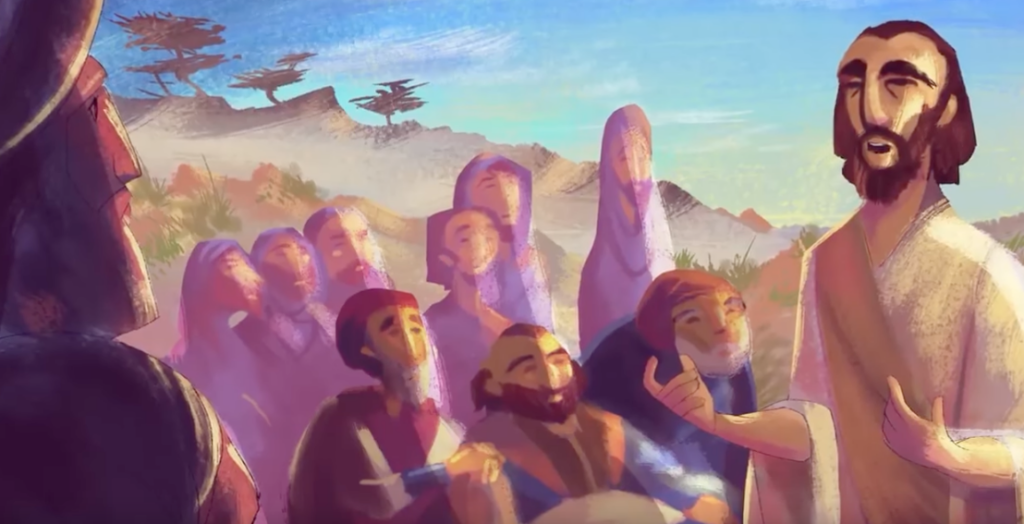Blessed are the Meek
What does it mean to be meek? It’s not really a word that we use anymore, but if its the meek that are the ones who are to inherit the earth, then we probably should figure out who they are. I think most would associate with a kind of weakness, shyness, or timidity and this is basically what you find when you look the word up in a modern dictionary the you get something like the following
- Cambridge Dictionary: ‘quiet, gentle, and not willing to argue or express your opinions in a forceful way’
- Merriam Webster Dictionary: ‘enduring injury with patience and without resentment; deficient in spirit and courage’ not violent or strong’
The problem with this however is that Jesus is described as being meek a couple of times in Matthew’s Gospel and he certainly wasn’t ‘deficient in spirit and courage’ or unwilling ‘to argue or express his opinions in a forceful way’. In Matthew 11:29 Jesus says, ‘take my yoke upon you and learn from me for I am gentle and humble in heart’ and the word for ‘gentle’ here is the same word that is translated as ‘meek’ in the beatitudes. Most translations go with either ‘gentle’ or ‘humble’ here but the ASV goes with ‘meek and lowly’. Later in 21:5 when Jesus enters Jerusalem during his last week alive, Matthew says that he fulfils the words from the prophet Zechariah that say, ‘Tell the daughter of Zion, Look, your king is coming to you, humble, and mounted on a donkey, and on a colt, the foal of a donkey’.
In a similar way to the previous versem the word for ‘humble here is the same word for meek and so it could read, ’Look your king is coming to you, meek, and mounted on a donkey’.

Whilst the two examples from Matthew’s Gospel do associate Jesus’ meekness with gentleness and humility, this must not be confused with weakness for Jesus was not one to shy away from confrontation and conflict. In fact, just after he enters into Jerusalem as the meek and humble king he gets into arguments with the religious leaders and drives others out of the temple with a whip! But, if Jesus is our example, if he is the model of what we aspire to become, the image in which we are being formed and conformed, then becoming meek is part of that process. It is something to be embraced and sought after, not avoided
“Men sometimes speak as if humility and meekness would rob us of what is noble and bold and manlike. O that all would believe that this is the nobility of the kingdom of heaven, that this is the royal spirit that the King of heaven displayed, that this is Godlike, to humble oneself, to become the servant of all!” ~ Andrew Murray
But even if we can determine that meekness is a good thing to be aspired after, that still doesn’t answer the question of what it is! However a key place we can look for beginning to build an answer is Psalm 37, because Jesus seems to be quoting directly from this psalm in this Beatitude.
Psalm 37
That Jesus is quoting from Psalm 37 here in this Beatitude can be seen quite clearly when you lay the two verses next to one another.
- Matthew 5:5 – ’blessed are the meek for they shall inherit the earth.
- Psalm 37:11 – ‘the meek shall inherit the earth’
But if this is the case then the next question becomes ‘why does is he doing it’? Well, something of an answer begins to emerge when you notice certain themes that run through the psalm and I want to draw attention to three that I believe are key.
- The first is the theme of the guarantee of God’s ultimate justice in the midst of a fallen world.
- The second is the theme of the choice of two paths, or ways of life – the way of the wicked or the way of the righteous.
- The third is where these two paths will take you – if you choose to walk the path of the wicked it will eventually lead you to death and destruction, and if you choose to walk righteously it will take you to life and blessing.
If we focus on the second and third themes about the different paths and where they will lead we will notice that the Psalm is constantly encouraging the reader to reject the way of the wicked and to walk the way of righteousness and it does this by not only contrasting the different way of living but by showing where each road will end up. For those who choose to walk the way of the wicked, the psalm says that they will soon fade like the grass, be cut off, be no more, face judgment for their choices, perish and vanish like smoke, and so on and so on. But those who trust in God and choose to walk in the way of righteousness will enjoy security, be given the desires of their hearts, be vindicated and recieve justice, delight in prosperity, enjoy abundance, and be kept safe. And a key phrase that is repeated throughout the psalm is that it is those who walk the way of righteousness who will inherit the land (v. 9, 11, 22, 29, 34). This is the bit that Jesus is quoting from, specifically it is verse 11 that says that the meek will inherit the land.
However, it is clearly the case that the world does not always reflect these realities and in fact, it often contradicts them in the way that the wicked often seem to flourish and prosper and the righteous often suffer and struggle. But this is where the first theme, the theme of God’s ultimate justice comes in for Scripture as a whole, and this Psalm in particular, want to remind us that this world in the present is not a reflection of God’s justice and that we are to trust God by continuing to live rightly in the present and looking toward the future when his judgments will put all things to rights. Therefore the Psalmist encourages the reader to stay the course by saying things like…
- ‘Do not fret because of the wicked’ (v1)
- Do not be envious of wrongdoers (v1)
- Refrain from anger and forsake wrath (v8)
- Depart from evil and do good (v27)
- Wait for the Lord and keep to his way (v34)
So, the Psalm seems to be doing a few different things here, which include laying out the choice we face in this life to either walk the way of wickedness or the way of righteousness and where these choices might lead us. It’s also presenting a picture of God’s justice whilst acknowledging that this justice is not always evident in this life and admits that the righteous sometimes suffer and the wicked sometimes prosper but therefore we need to trust God to act justly in the end and to continue to live rightly in the present.
Blessed are the Meek
All of this helps us to begin to fill out what Jesus might have meant when he said, ‘blessed are the meek, for they shall inherit the earth’. The meek seem to be those who refuse to play the game of the wicked despite suffering at their hands, who refuse to exploit and abuse others to get ahead, who don’t leverage their power or privilege to oppress others, but who continue to choose to walk the path of costly integrity and righteousness, trusting that God will vindicate their choices one day.

Meekness, in this sense, then is not weakness but a form of power, because its about making the choice to live rightly in this world despite the cost, its about refusing to take justice into your own hands but trusting God to bring it about instead. It might look like…
- choosing to love your enemies instead of hating them.
- Choosing to forgive instead of holding a grudge
- Choosing to turn the other cheek instead of hitting back
- Willingly going a second mile when someone tries to force you to go one.
Each of these examples are taken from other things that Jesus says in the Sermon on the Mount and so the Sermon itself might be something of a commentary on what it means to be meek!
“The meek man will attain a place of soul rest. As he walks on in meekness he will be happy to let God defend him. The old struggle to defend himself is over. He has found the peace which meekness brings.” ~ A.W Tozer
So let’s pause and remember what Jesus is doing with the Beatitudes – i.e. inviting people to see the world differently, to re-evaluate their value systems, and to align their lives with the in-breaking kingdom of God. So, if we are close to being correct about this then Jesus, in quoting from Psalm 37, seems to be calling his followers to live rightly, to live meekly and to not be tempted to join the way of the wicked but to trust that God will bring about his justice one day. But this is not easy is it? For in our day, just as it was in the days of the Psalmist and the early church, it sometimes it feels like those who use and abuse others, who have no care for justice, who use violence and brutality, are the ones who prosper, and the lowly, the gentle, the humble, and the meek just get walked over and taken advantage of. But this is where we need to allow the Beatitudes to completely reshape our perspectives, to have our minds renewed.
What About Us?
But what about us? Well, if any of the following questions resonate with you at all then maybe, just maybe, this beatitude has something for you.
- Do we sometimes find ourselves envious of those who do wrong and still prosper?
- Are we tempted to compromise our values and beliefs in order to get a bit further ahead in life.
- Do we feel a bit let down by God because we have tried to live rightly but still seem to struggle?
- Are we finding it hard to believe that God is, and will continue, to bring about justice in the world?
- Have we become a bit cynical and jaded about the possibility of living a life modelled on Jesus in the midst of a ‘everyperson for themselves’ world?
- Does the Sermon on the Mount just seem like an absolute pipe dream?
- Is meekness just an excuse for weakness that religious people made up to comfort them as they get walked over?
If you can relate to any of this then this Beatitude is for you and you need to engage it, to sit before it until it begins to break down some of the lies and deceptions that you have come to believe. Together we need to hold it, value it, memorise it, paint it, sing it, speak it, and wrestle with it until our souls are slowly filled with the condition that it really is true! We need to hear Jesus, the Messiah, Son of God, the messenger come from heaven and say to us once again, ‘Blessed are the meek, for they shall inherit the earth’!

